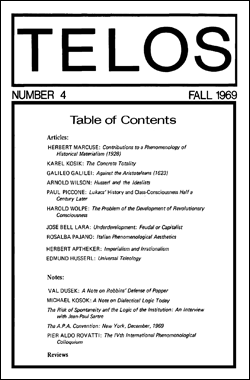As an occasional feature on TELOSscope, we highlight a past Telos article whose critical insights continue to illuminate our thinking and challenge our assumptions. Today, Linas Jokubaitis looks at Paul Piccone’s “Lukács’s History and Class Consciousness Half a Century Later,” from Telos 4 (Fall 1969).
In 1969, when Paul Piccone wrote “Lukács’s History and Class Consciousness Half a Century Later,” almost fifty years had passed since the publication of Georg Lukács’s magnum opus. Piccone wrote this essay to mark that anniversary, and he argued that this work was an “underground classic.” Moreover, he asserted that this book was essential for any analysis of modern thought. According to Piccone, everyone attempting to understand and overcome the ideological crisis of Marxism would be wise to consult this book.
Piccone writes:
With Marxism securely ossified in communist orthodoxy, and bourgeois thought harmlessly unleashed at the annihilation of micro-problems, the Lukácsian discourse of History and Class Consciousness is foreign to establishment thought formed in the intellectual wastelands of the 40s and 50s. But this is only a temporary stability hacked out of the ideological stalemate of peaceful coexistence—the international fraud that reduces the predicament of mankind to a choice between Western computerized exploitation and Russian authoritarian repression. As what nowadays appear as minor political vibrations turn into earthquakes, fundamental questions will again be the order of the day. (112)
 Nearly 45 years later, diagnosis and prophecy have proven to be quite true. Few today would call History and Class Consciousness an “underground classic,” because it has left the underground to become a fully established classic. However, it seems very clear that the political situation has remained the same. Minor political vibrations felt during the 1960s across the West did not turn into earthquakes.
Nearly 45 years later, diagnosis and prophecy have proven to be quite true. Few today would call History and Class Consciousness an “underground classic,” because it has left the underground to become a fully established classic. However, it seems very clear that the political situation has remained the same. Minor political vibrations felt during the 1960s across the West did not turn into earthquakes.
Temporary stability of peaceful coexistence during the 1970s today seems to have become a perpetual peace. One even looks back with envy at what Piccone called the “intellectual fraud” that reduces the choice of mankind to the American and Soviet alternatives. Today there are no longer any alternatives, and all contemporary thought is directed at the solution of micro-problems. At the end of history, there are no longer any classes. Hence, Lukácsian discourse about class-consciousness can sound foreign to our ears. There can be no doubt that History and Class Consciousness today is an established classic, but it is only of historical interest to academia. This would be the position of the other great student of Hegel and Marx, Alexandre Kojève. What could we say in defense of History and Class Consciousness in 2013?
One has to begin by noting that Piccone is right in calling this book “the last and most creative philosophical work of Marxism of this century” (111). He reminds us how Lucien Goldmann thought that Being and Time was an “existential polemic tacitly directed against Lukács’s History and Class Consciousness” (109); and Lichtheim claimed that Mannheim’s Ideology and Utopia was meant as an answer to the same book (111). Even if one does not agree with these interpretations, one must acknowledge that they confirm the creativity and originality of Lukács’s achievements in History and Class Consciousness. The significance of this work was acknowledged even by the “enemy,” Carl Schmitt, who in his essay “Hegel und Marx” mentioned Lukács as having shown “with great power” the relationship between Hegel and Marx. There are no grounds to doubt the intellectual quality of this book. However, one must ask the question about its practical value. After all, this was the thing that mattered to Lukács. For him, Marxism was never a dogmatic belief in sacred texts:
regarding Marxism, orthodoxy refers exclusively to questions of method. And this method, of course, is the dialectical method. Its central problem is the “modification of reality”—the practical implementation of the revolutionary theory which is itself nothing more than the apprehension of the problematic situation and the conceptual mediation for its solution. In other words, the dialectical method is presented as the key to the revolution. (98)
For Lukács, History and Class Consciousness was only a means to an end—the success of the revolution. When viewed from this perspective, which was the most important goal for him, one can maintain that this book was a failure. The revolution did not succeed. In this respect, however, the actuality of History and Class Consciousness remains as rich as it was for Piccone in 1969. For anyone who today believes in the Marxist project for the “modification of reality” this work remains the most important one written in the twentieth century. History and Class Consciousness was, and still remains, the real adventures of the dialectic. Indeed, the opening essay “What is Orthodox Marxism?” is still a catechism of a revolutionary.
Anyone who is not satisfied with “micro-problems” of contemporary thought is advised to look to History and Class Consciousness for a sense of intellectual ambitions that are foreign to the twenty-first century, and also to Piccone’s essay, which remains a welcome introduction to this highly abstract and yet, at the same time, polemical book.



